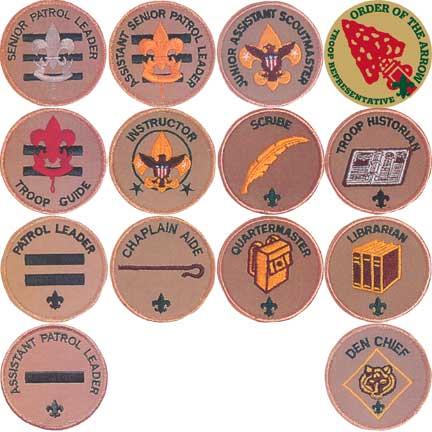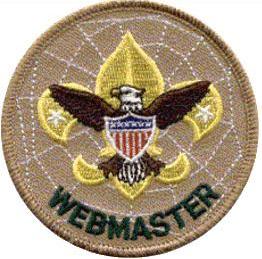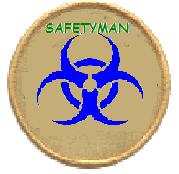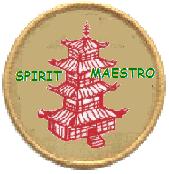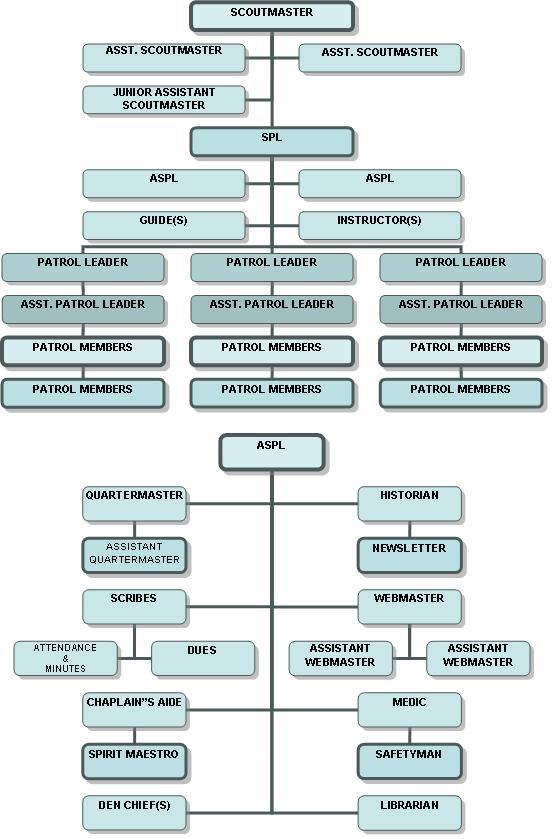As a scout starts to advance within the troop, he will hold various leadership positions:
In order to apply for a job, fill out the Leadership Application on the Forms page.
_________________________________________________________________

Senior Patrol Leader (Req. Star & 15 Years Old)
The Senior Patrol Leader is the leader of the Troop (the Scoutmaster serves an advisory/guidance role). The SPL is…
- Responsible for the Troop’s overall operation.
- In charge of Troop meetings, heads the Patrol Leaders’ Council, and is in charge of all Troop activities. He does everything he can to help each patrol be successful.
- Responsible for annual program planning conferences and assists the Scoutmaster in conducting the Troop Junior Leader Training.
- Presides over the Patrol Leaders’ Council and works closely with each Patrol Leader to plan Troop meetings and make arrangements for troop activities.
- Plans campouts and meetings through extensive plans and coordinates factors such as schedule and transportation
- Serves as a link between the parent committee and the scouts
All members of a troop vote by secret ballot to choose their senior patrol leader. Rank and age requirements to be a senior patrol leader are that of First Class Rank and 14 years of age. During a Scout’s time as senior patrol leader, he is not a member of any patrol.

Assistant Senior Patrol Leader (Req. 1st Class & 14 Years Old)
The Senior Patrol Leader appoints the Assistant Senior Patrol Leader with the approval of the Scoutmaster (there are no elections held for this position). Among the assistant senior patrol leader’s specific duties are:
- Providing training and guidance for the troop’s quartermaster, scribe, Order of the Arrow representative, historian, librarian, and instructors.
- Coordinating all positions within the troop (except for the PLs)
- Serving in place of the senior patrol leader at meetings and events when the senior patrol leader must be absent.
The assistant senior patrol leader is not a member of a patrol. Our troop typically has two assistant senior patrol leaders.
 Patrol Leader (Req. 2nd Class & 13 Years Old)
Patrol Leader (Req. 2nd Class & 13 Years Old)
The Patrol Leader represents his Patrol at all Patrol Leaders’ Council meetings and the Program Planning Conference.
- He solicits ideas and concerns from members of his Patrol and keeps members of his Patrol informed of decisions made by the Patrol Leaders’ Council.
- He plays a key role in planning, leading, and evaluating Patrol meetings and activities.
- He helps the patrol prepare to participate in all Troop activities.
- He learns about the abilities of other Patrol members and fully involves them in Patrol and Troop activities by assigning them specific tasks and responsibilities.
- He is responsible for making a flag that represents his patrol
- He is responsible for coordinating a fun project within his patrol
- He is responsible for coordinating a patrol community service project that he and his patrol takes part in

Assistant Patrol Leader
Each Patrol Leader appoints an Assistant Patrol Leader (APL) to serve concurrently with the Patrol Leader’s six month term of office. The APL helps in leading the Patrol and substitutes for the Patrol Leader whenever the Patrol Leader is absent. The Assistant Patrol Leader should attend Troop Junior Leader Training and Patrol Leader’s Council meeting whenever possible.

Guide
Each patrol-in a troop should have its own troop guide. A troop guide is an older Scout who holds the rank of First Class or higher, has strong teaching skills, and possesses the patience to work with new Scouts. As a mentor to the patrol leader of the new-Scout patrol, he provides direction for the patrol leader and helps him with his patrol leader responsibilities. The troop guide accompanies the patrol on troop campouts and makes himself available to assist the new Scouts as they learn fundamental Scouting skills. Along with the patrol leader of the patrol, he is a member of the patrol leaders’ council.

Instructor
Each instructor is an older troop member who is proficient in Scouting skills and has the ability to teach those skills to others. The subjects that instructors may wish to teach include any of the areas that Scouts want to master, especially those such as first aid, camping, backpacking, orienteering, and others required for outdoor activities and rank advancement. A troop may have more than one instructor.
- Camping Instructor
- Tenderfoot Requirements #1, #2, #11
- Second Class Requirements #2b, #2c, #2d, #2e, #2f
- Cooking Instructor
- Tenderfoot Requirement #3
- Second Class Requirement #2g
- First Class Requirements #4a, #4b, #4c, #4d, #4e
- First Aid Instructor
- Tenderfoot Requirements #12a, #12b
- Second Class Requirements #6a, #6b, #6c
- First Class Requirements #8b, #8c, #8d
- Hiking & Orienteering Instructor
- Tenderfoot Requirements #5, #9, #11
- Second Class Requirements #1a, #1b, #5
- First Class Requirements #1, #2, #6
- Knots & Lashings Instructor
- Tenderfoot Requirements #4a, #4b
- First Class Requirements #7a, #7b, #7c, #8a
- Swimming and Lifesaving Instructor
- Tenderfoot Requirement #9
- Second Class Requirements #7a, #7c
- First Class Requirements #9a, #9c

Bugler
From time-to-time the Troop may have a Troop Bugler. The bugler wakes up the troop at campouts and is responsible for all music-related activities.

Chaplain Aide
The chaplain Aide assists the Troop Chaplain (an adult from the troop committee or the chartered organization) in conducting the Troop’s religious observances.
- He sees that religious holidays are considered during program planning
- He promotes the religious emblems program.
- He encourages Troop members to strengthen their own relationship with God through personal prayer and devotions and participation in religious activities.
- He is sensitive to the various theological and religious positions embraced by the faiths represented in the Troop, and acts accordingly.
- He is in charge of saying a brief prayer every troop meeting and conducting the presentation of colors. He is also required to give a invocation and a benediction at troop events; these events require longer, more sophisticated prayers

Historian
The troop historian collects and preserves troop photographs, news stories, trophies, flags, scrapbooks, awards, and other memorabilia. He may also gather and organize information about the troop’s former members and leaders, and make those materials available for Scouting activities, media contacts, and troop history projects. Troop displays prepared by the historian can be used during courts of honor, troop open houses, and other special Scouting occasions.

Librarian
The troop librarian oversees the care and use of troop books, merit badge pamphlets, magazines, audiovisuals, diskettes, and lists of merit badge counselors. He checks out these materials to Scouts and leaders and maintains records to ensure that all items are returned. He may also suggest the purchase of new literature and report the need to repair or replace any current items.
 Quartermaster
Quartermaster
The Troop Quartermaster is the Troop’s supply boss. He keeps an inventory of Troop equipment and sees that the gear is in good condition. He works with Patrol Quartermasters as they check out equipment and return it, and at meetings of the Patrol Leader’s Council reports on the status of equipment in need of replacement and repair. In carrying out his responsibilities he may have the guidance of the Troop Committee’s Equipment Chair.

Scribe
The scribe is the Troop’s secretary. He keeps the minutes of the patrol leaders’ council meetings but is not a voting member of the council (no green bar). The scribe may also keep attendance records of other troop activities, such as campouts and service projects. During troop meetings, he works with patrol scribes to ensure the accurate recording of attendance and payment of dues, and to keep advancement records up-to-date. The scribe may also be responsible for maintaining a troop Web site with information that is current and correct. An adult who is a member of the troop committee may be assigned to help the troop scribe carry out his responsibilities.
- Attendance Scribe: Takes attendance at meetings/campouts
- Minutes Scribe: Takes notes at the PLC
- Dues Scribe: Collects the monthly dues from scouts
Webmaster
This position reports to the Adult Webmaster. With the assistance of the Adult Webmaster he is responsible for making sure every important aspect of the troop is represented on the troop website. He works very closely with the Adult Webmaster in order to complete this task, but there is much that he can do independently. Because of the steep learning curve involved with this position, someone can hold this office longer than a normal junior leadership position. Duties of the Webmaster include consistently promote all aspects of the troop website, explain how scouts can use the website to their advantage, maintain the troop website and assist other Scouts with posting information on the website (when approved by Adult Webmaster/Scoutmaster), and help train future Webmasters. Prerequisites for being the Webmaster: Being highly active and committed in the troop, plan on being in the troop for at least several years in the future, and willing to spend time outside of normal troop activities to be trained in web development and in maintaining the site.
Safetyman (unofficial BSA credit position)
Is responsible for giving a safety tip every week, making sure that all activities are designated to be safe
Spirit Maestro (unofficial BSA credit position)
Is responsible for the troop’s spirit, leads them in such activities. He is in charge of songs and skits.
Medic (unofficial BSA credit position)
The medic is in charge of checking the troop’s facilities and makes sure that they are in working order and do not pose a danger to anyone’s health. He is also the troop’s first aid expert, immediately ready to administer first aid should someone in or outside the troop get hurt

Den Chief
- General Den Chief: A Den Chief works with a den of Cub Scouts and with their adult leader. He assists with den meetings, encourages Cub Scout advancement, and serves as a role model for younger boys. Being a den chief can be a great first leadership experience for a Scout. Depending on the number of dens in the Cub Scout packs of its community, a troop may have several members serving as den chiefs. Den chiefs can be a great asset to den leaders and are deeply appreciated and admired by Cub Scouts and Cub Scout leaders alike.
- Webelos Den Chief: A Webelos den chief meets each week with a Webelos den and helps its adult leader guide the Webelos Scouts to make the most of their program. He can assist with den meetings and activities, lead songs and games, and encourage Webelos Scouts to look forward to the adventure of Boy Scouting that awaits them when they are old enough to join the troop.

Junior Assistant Scoutmaster (Req. Eagle & 16 Years Old)
A Scout at least 16 years of age who has shown outstanding leadership skills may be appointed by the Senior Patrol Leader, with the consent of the Scoutmaster, to serve as a Junior Assistant Scoutmaster. A Junior Assistant Scoutmaster follows the guidance of the Scoutmaster in providing support and supervision to the troop’s other boy leaders. He can be a valuable resource for teaching Scouting skills to younger Scouts and in providing leadership to the troop. Upon turning 18, a junior assistant Scoutmaster is eligible to become an assistant Scoutmaster. A troop may have more than one Junior Assistant Scoutmaster.

Order of the Arrow Representative (not a job)
An Order of the Arrow representative can be appointed by the senior patrol leader to be a link between the troop and the local Order of the Arrow lodge. By enhancing the image of the Order as a service arm to the troop, the representative promotes the OA, urges troop members to take part in resident camping, and encourages older Scouts to seek out opportunities for high adventure. The OA representative assists with leadership skills training in the troop and supports fellow Arrowmen undertaking unit leadership roles: He reports to the assistant senior patrol leader.
_________________________________________________________________
For more information on the job requirements, view the leadership positions in detail
If, at the end of the term, the Scout has satisfactorily completed the requirements stated in the job description, he will recieve job credit along with a certificate to prove his service.
The leadership hierarchy is as follows:
The Leaderhip Hierarchy is intended to give people an idea of the chain of command. It all starts with the Scoutmaster, down to their Junior Assistants. Then the scouts who are working towards Eagle come in. The SPL, with the help of his 2 ASPLs, manages the boys. The patrol leaders are in charge of the smaller subunits called patrols. The Guide and Instructor are also part of the senior leadership (consisting of SPL, ASPL, PL) and have authority even though they belong to a patrol. All other positions do not have authority in respect towards the chain of command. Every position outside the senior leadership reports to their ASPLs.
ELECTION NIGHT
Certain rules (click to view) are generally followed on Election Night. Failure to comply with the rules may result in a disqualification in the job that you desire or the loss of the ability to cast your vote for others. The incumbent SPL and the JASM carry out the elections until a new SPL is chosen. The new SPL, along with the help of the JASM, will run the election process for the duration of the evening.
Speeches are given, votes tallied, and people appointed all according to the agenda (click to view). The agenda will be read at the beginning of the meeting, to ensure that all are familiar with the process.
SCOUTING SPIRIT
In order to be a successful leader in our troop, one must have scouting spirit (click to view). Read up and find out what it means to truly be a Scout
__________________________________________________________________
These descriptions of jobs and the chain of command are solely for informative purposes only. They are not meant to influence a Scouts decision on what to run for, but rather to shape it and lead them in the right direction. Regardless of what job one may seek out, the Scout must fill out an application form and turn it in to the Scoutmaster or SPL propr to election day. Those who are planning to run for leadership positions (SPL & PL) must contact the Scoutmaster approximately a month in beforehand and confide their interests in taking up the said position. Note that you cannot RUN for ASPL. The ASPLs are appointed by the new SPL, and his selections usually are from his fellow opponents in the race. If you wish to be an ASPL, contact all candidates for SPL and tell them of your interest.
